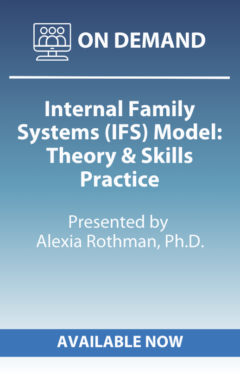Description
LIVE STREAM: November 25 – 27, 2024 from 8:30am – 4:00pm (Vancouver, BC) Please adjust your start time according to your specific time zone.
ON-DEMAND: Recorded footage & course content (certificate, videos, quiz) will be available December 1- 28, 2024. Extensions cannot be granted under any circumstances.
Registration will close November 24, 2024.
Monday, November 25, 2024 | Day One
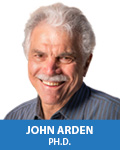 An Integrated Approach to Trauma Treatment: Synthesizing Neuroscience, Attachment Theory and Evidence-Based Modalities
An Integrated Approach to Trauma Treatment: Synthesizing Neuroscience, Attachment Theory and Evidence-Based Modalities
WORKSHOPS 1 & 3: PRESENTED BY John Arden, Ph.D.
This important workshop, facilitated by Dr John Arden, a world-renowned psychologist, teacher and author, will offer a wealth of knowledge and practical strategies that use a synthesized model of neuroscience, attachment theory and evidence-based treatment to more effectively treat clients who have experienced complex trauma.
You will learn about the latest research in neuroscience, epigenetics, immunology and endocrinology, and how these discoveries can be synthesized with evidence-based trauma treatments, psychotherapy research and attachment theory into a hybrid therapeutic model. This model will help you identify which elements of psychotherapeutic schools are effective and which may be counter-therapeutic in the trauma treatment context. You will be challenged and supported to move beyond any specific theoretical paradigms towards a common factors approach.
Engaging with real life examples, you will gain a deeper understanding of how addressing nervous system functioning is a fundamental therapeutic process in improving mood and behaviour and achieving a reduction in symptoms. Special attention will be given to addressing the neurodynamics of PTSD and the crucial role of memory.
At the end of this workshop, you will come away with many powerful tools, understandings and confidence to better assist your traumatised clients on their path to recovery and to live a fuller life.
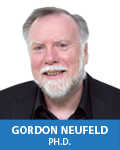 Stress and Trauma: An Attachment-Based Perspective
Stress and Trauma: An Attachment-Based Perspective
WORKSHOPS 2 & 4: PRESENTED BY Gordon Neufeld, Ph.D.
Fresh insights from the sciences of development, emotion and attachment shed light on the hidden wisdom of the stress response, the essence of trauma, and the pivotal role of both attachment and emotion in etiology and recovery. What is also revealed in putting the pieces together is a common denominator that cuts across syndromes and diagnoses and informs intervention. While the material is presented with clinicians in mind, this model of stress and trauma applies across all ages and venues, including private practice, treatment programs, as well as personal healing and recovery. This model also has significant implications for the prevention, recognition and treatment of distressed children and youth, whether via the school, the family, special programs or direct treatment.
Tuesday, November 26, 2024 | Day Two
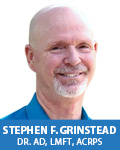 A Mind-Body Approach to Address Chronic Pain and Co-Existing Disorders
A Mind-Body Approach to Address Chronic Pain and Co-Existing Disorders
WORKSHOP 5: PRESENTED BY Steve Grinstead, M.A.
The landscape of chronic pain treatment continues to evolve and change as we wean ourselves off the traditional biomedical approach that often over-emphasizes harmful opioid-based pain management interventions. In this presentation you will learn the unique challenges and obstacles that face chronic pain patients suffering with their pain and coexisting disorders, including medication misuse abuse or addiction. By understanding these unique challenges, you will discover that it requires an integrated, collaborative, and concurrent Body-Mind-Spirit team approach to achieve the best possible treatment outcomes.
Join chronic pain management international expert, Dr. Stephen F. Grinstead, for this dynamic interactive presentation. You will obtain the proper understanding, skills and treatment techniques you need to address the neurobiological psychological/emotional, social and Spiritual aspects of chronic pain when traditional biomedical interventions are no longer a viable option. By attending this presentation, you will discover how common coexisting disorders and family dynamics can also sabotage treatment – and what to do about it. You will learn how to develop a synergistic treatment plan incorporating the mind, body and spirit for healing as well as strategies to empower clients to be proactive in their healing process.
 Conquering Anxiety: Strategies for Helping Your Anxious Clients
Conquering Anxiety: Strategies for Helping Your Anxious Clients
WORKSHOPS 6 & 9: PRESENTED BY Caroline Buzanko, Ph.D., R. Psych
Despite all the resources and training programs out there, in our post-pandemic world, anxiety is more pervasive than ever before, and people are finding it harder and harder to cope. Unfortunately, when they seek support, many anxious clients do not receive the right kind of help and some professionals even make anxiety worse.
In this workshop, you will discover evidence-based interventions and practical strategies to boost anxious client’s internal locus of control and master anxiety. Designed specifically for mental health professionals, this workshop goes beyond the basics and offers specialized knowledge and skills to optimize outcomes with anxious clients. Using a transdiagnostic approach, you’ll leave with a toolbox filled with concrete strategies that you can use immediately, no matter the nature or severity of your clients’ anxiety.
“Caroline was an excellent presenter who kept my interest throughout. Her genuine care for children and clinical examples were fantastic. Thank you!” – Edmonton, AB, Spring 2024
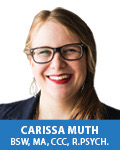 Proven Interventions for Complex PTSD
Proven Interventions for Complex PTSD
WORKSHOP 7: PRESENTED BY Carissa Muth, Psy.D., CCC, R.Psych
Complex Post-Traumatic Stress Disorder (CPTSD) manifests after exposure to one or multiple extremely threatening or traumatic events, presenting additional severe and persistent symptoms beyond those of PTSD. Dr. Muth’s three-hour workshop delves into the distinct characteristics of CPTSD, highlighting its unique challenges and treatment approaches.
Drawing upon current research, Dr. Muth will elucidate the nuances that differentiate CPTSD from other diagnoses. Participants will gain insights into the impact of disturbances in self-organization, such as negative beliefs about oneself, emotional dysregulation, and interpersonal difficulties, crucial for accurate diagnosis and effective treatment planning.
The workshop will focus on the application of evidence-based interventions tailored specifically for CPTSD. Dr. Muth will explore Cognitive Behavioral Therapy (CBT), Cognitive Processing Therapy (CPT), Interpersonal Psychotherapy (IPT), and Dialectical Behavior Therapy (DBT), offering participants a comprehensive toolkit for addressing the complexities of this disorder.
Through a detailed case study of a client with CPTSD and comorbid Attention-Deficit/Hyperactivity Disorder (ADHD), attendees will learn step-by-step strategies for implementing evidenced-based interventions. Special emphasis will be placed on addressing both disturbances in self-organization and core PTSD symptoms, ensuring a holistic approach to treatment.
Join Dr. Muth in this comprehensive workshop to deepen your understanding of CPTSD and enhance your clinical skills in treating this complex disorder.
Effective and Strategic Intervention Plans to Reduce Relapse Episodes
WORKSHOP 8: PRESENTED BY Steve Grinstead, M.A.
This interactive presentation is for professional healthcare clinicians who want to learn how to assist their clients to identify and manage the progressive warning signs and high risks situations that lead to alcohol or other drug (AOD) relapse despite a commitment to sobriety. You will learn that relapse is a process not an event and that there are many identifiable warning signs and high-risk situations that occur far in advance of their AOD use. Valuable tools will be introduced that will enable you to assist your clients to take the mystery out of the relapse process and develop a strategic relapse prevention plan. You will learn how to utilize and personalize the “Relapse Cycle” and “Relapse Autopsy” processes to better help your clients in preventing a future relapse cycle.
You will also learn how to develop an early relapse intervention plan (R.I.P.). Then you will be led through a strategic step by step high risk situation identification process. The process ends with teaching participants to help clients finalize a relapse prevention plan designed to help them better identify and manage future warning signs and high-risk situations. This workshop includes a combination of lectures, and interactive group discussions, designed to enhance the training process.
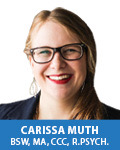 Motivational Interviewing Techniques: Brief Interventions to Help the Unmotivated Client
Motivational Interviewing Techniques: Brief Interventions to Help the Unmotivated Client
WORKSHOP #10: PRESENTED BY Carissa Muth, Psy.D., CCC, R.Psych
Unlock the power of motivational interviewing (MI) to guide clients past ambivalence and toward meaningful action in their lives. This transformative three-hour workshop offers practical strategies and evidenced-based techniques to empower treatment providers in facilitating change even in the face of resistance. Led by Dr. Muth, participants will delve into the core principles of MI, learning how to leverage language and employ a collaborative approach to ignite and sustain their clients’ internal motivation. Through a four-step process, attendees will discover how to effectively navigate conversations, overcome resistance, and propel clients toward achieving their goals.
Wednesday, November 27, 2024 | Day Three
Art Therapy Interventions for Anxiety, Chronic Pain, Addictions, Grief and Loss
WORKSHOPS 11 & 14: PRESENTED BY Pamela Malkoff Hayes, MFT, LMHC, LPC, ATR-BC
Are you seeking potent techniques to aid clients grappling with anxiety, chronic pain, addictions, or feeling stuck? Dive into an accessible Art Therapy approach to evaluate and tackle anxious and self-destructive behaviors. The Creative Cognitive Therapy Method, developed by Pamela Hayes Malkoff, offers a comprehensive system merging traditional cognitive behavioral therapy with Art Therapy techniques, facilitating profound client transformation for a better quality of life. This succinct 10-session program maintains a solution-focused approach, aiding clients in maintaining focus, gaining fresh perspectives, and bolstering daily coping skills.
This cutting-edge seminar employs case studies, hands-on art experiences, demonstrations, and interactive discussions to foster creative thinking and encourage clients to replace ego-driven reactions with thoughtful responses. Delve into the integration of Art Therapy with CBT, Positive Psychology, and Mindfulness to foster delayed gratification, shift worldviews, process fears, embrace imperfections, and release past resentments and pain. Engage in firsthand experiences, creating your own art, and discover how stepping outside your comfort zone can empower and harmonize both negative and positive emotions.

Couples Therapy to Transform Your Practice: Help Couples Build Lasting Relationships that Thrive
WORKSHOP 12: PRESENTED BY Carissa Muth, Psy.D., CCC, R.Psych
Join us for a transformative journey as we delve into the intricate dynamics of couples’ relationships. Often, by the time couples seek therapy, layers of resentment have built up, creating a barrier that seems insurmountable. In this three-hour workshop, Dr. Muth will guide participants through an integrated approach drawing from Emotion Focused Therapy, Nonviolent Communication, and research by the Gottmans.
Rather than offering a one-size-fits-all solution, this workshop emphasizes a holistic understanding of relationship dynamics. Participants will gain insight into coordinating identified needs in relationships with appropriate therapeutic interventions. Through exploring the science behind abandonment and connection, attendees will learn effective strategies for addressing these issues in treatment sessions. Additionally, tools will be provided for working with clients who struggle with empathy, empowering therapists to navigate such challenges with confidence.
Embark on this journey of discovery and equip yourself with the skills needed to help couples build lasting and thriving relationships.
Acceptance and Commitment Therapy: Transcending Traditional Approaches
WORKSHOPS 13 & 16: PRESENTED BY Jennifer Patterson, Psy.D., LCPC
In this foundational course, participants will embark on a transformative journey into Acceptance and Commitment Therapy (ACT). ACT is a third-wave cognitive-behavioral therapy that transcends traditional approaches by seamlessly weaving together the processes of acceptance, mindfulness, and behavior change principles. Through experiential learning and evidence-based techniques, participants will cultivate a profound understanding of ACT and its practical applications.
Join ACT expert and International trainer Jennifer Patterson, Psy.D., LCPC, for this workshop, where you will develop efficient, evidence-based skills, case conceptualization techniques, and powerful strategies that will improve outcomes.

MDMA-Assisted Psychotherapy for PTSD & Improving Social Connectedness
WORKSHOP #15: PRESENTED BY Sara Klinkhamer MA, RCC
Psychedelic-assisted psychotherapy is making a comeback, and this time it doesn’t look like it is going anywhere despite some significant controversies in the last few years. The most research has been conducted with MDMA for chronic PTSD, with Phase 3 clinical trials complete and the application into the FDA, it is expected to be approved by the end of this year in the United States. Already here in Canada many people have received treatment through the Special Access Program (SAP) and expanded access is on the horizon. For this 3-hour workshop, Sara Klinkhamer will focus on MDMA-assisted psychotherapy, which has also been the focus of the PhD she is currently completing through the California Institute of Integral Studies. It will be argued here that MDMA-assisted psychotherapy is particularly effective for treating PTSD because it improves one’s sense of social connectedness and social connectedness moderates PTSD symptom severity. A brief history and context will situate these claims. The talk will also include a discussion of the possibility that MDMA-assisted psychotherapy improves one’s sense of connectedness in general. Current and future research may show it is effective for treating various ‘maladies of disconnection’ including addiction, depression, relationship problems and other existential issues.





